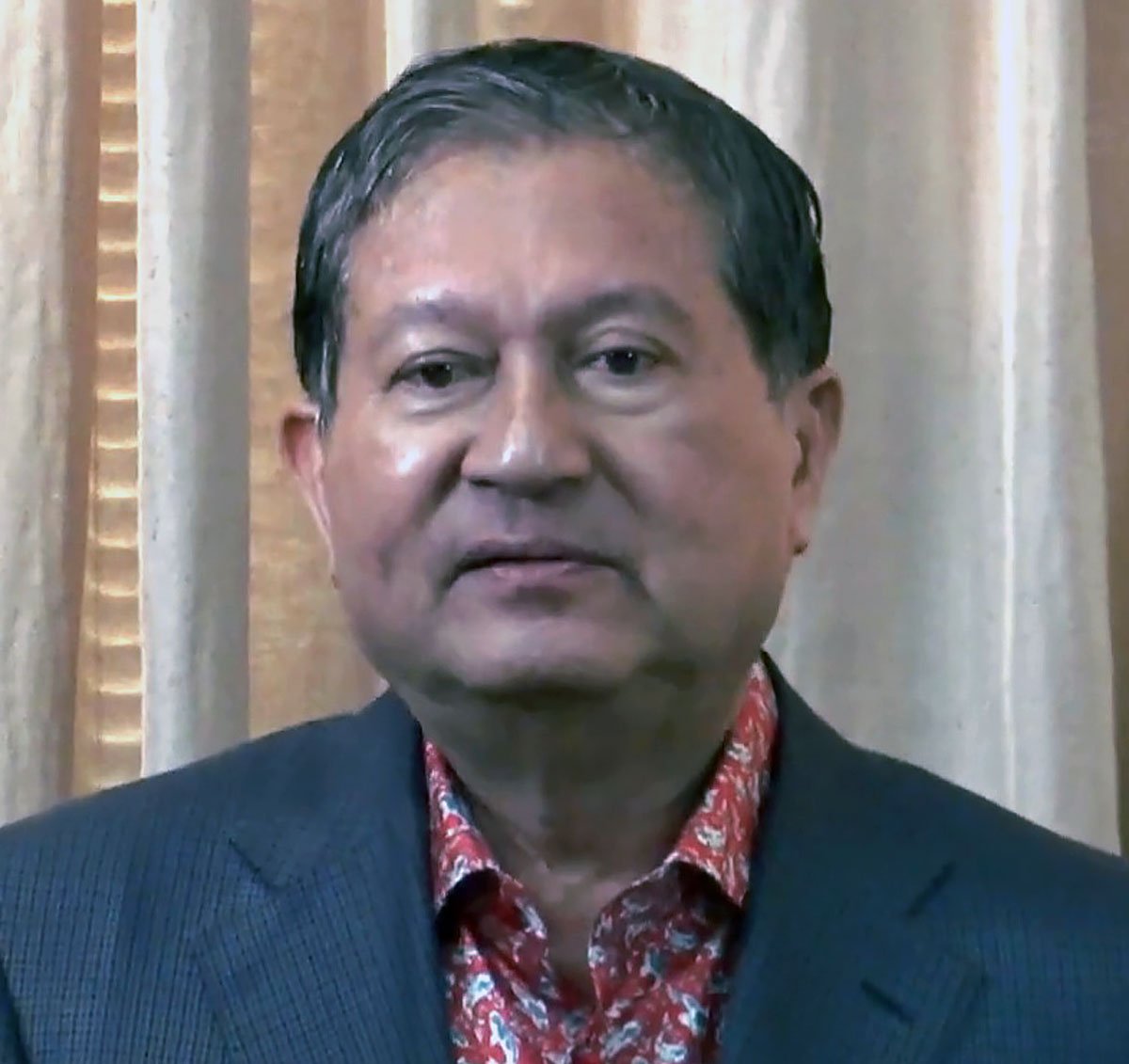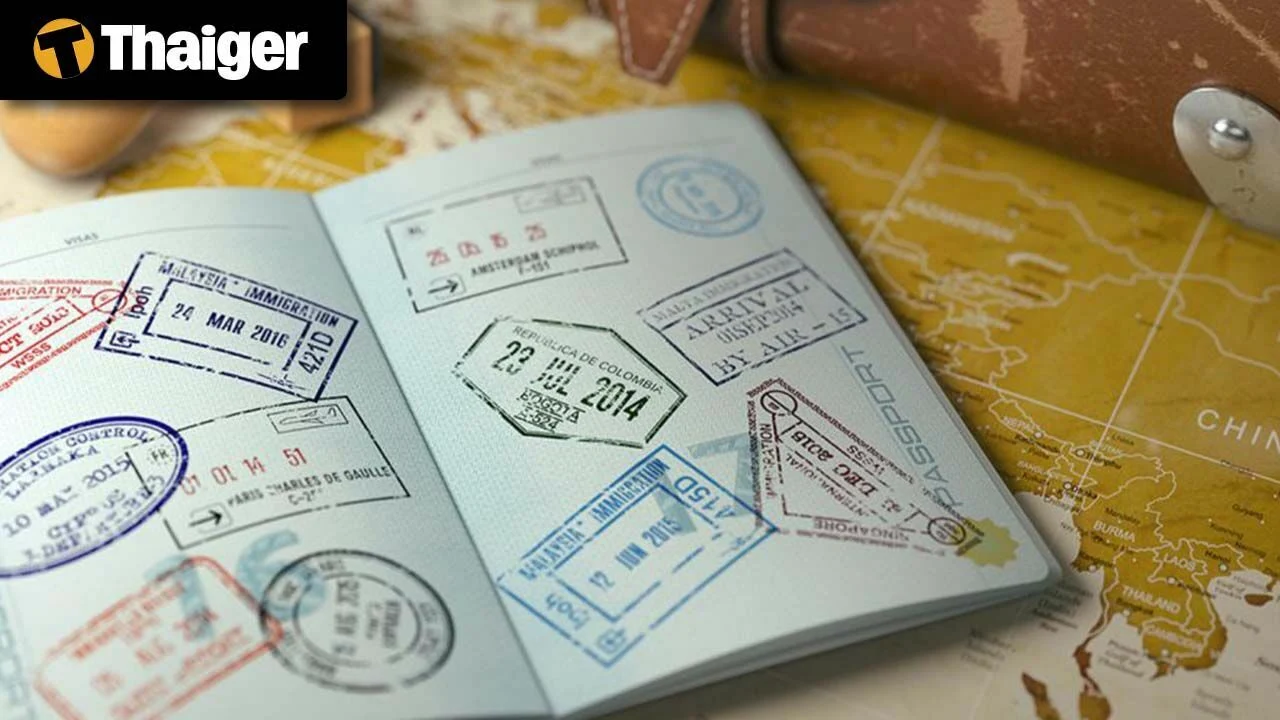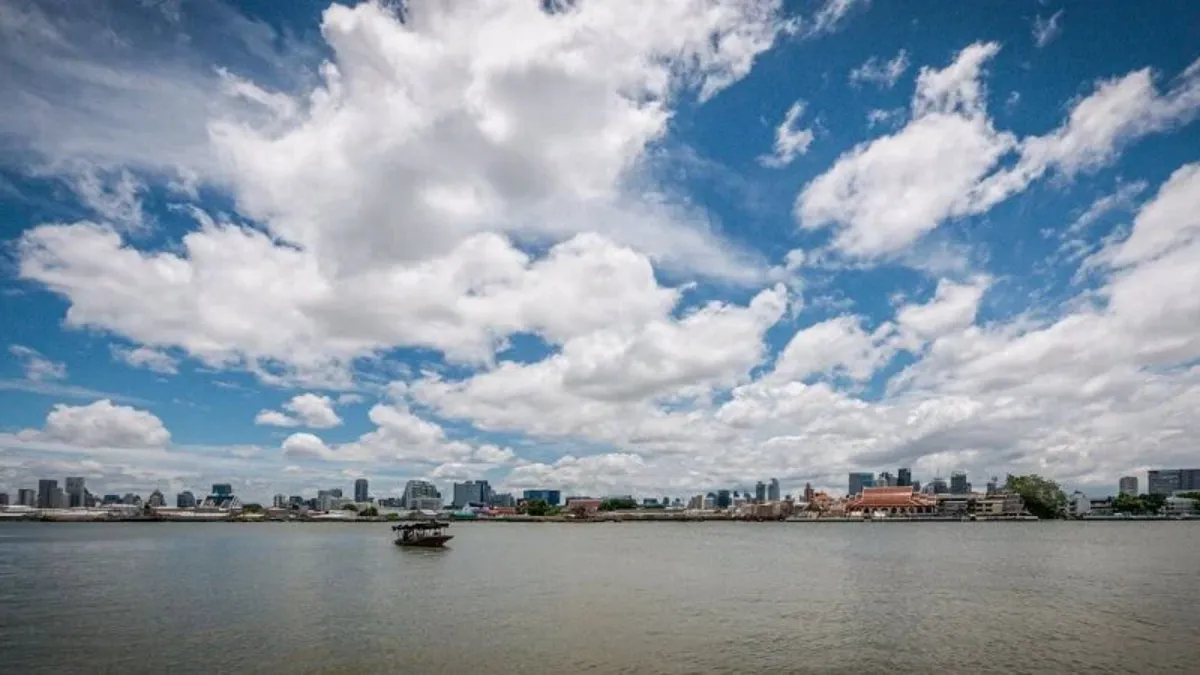Nyheter fra Thailand - levert av ASEAN-now (Tidligere Thai Visa)

My RSS Feed
- Thailand Live Saturday 27 July 2024

The government estimates that over 5 million domestic tourists will travel within Thailand during the long weekend in July 2024, generating more than 18 billion Baht in economic activity.
Over 5 Million Domestic Tourists Expected During July Long Holidays in Thailand
26 July 26 20241333952 - Thai beauty queen sparks online drama over airline seat

A misunderstanding involving Thai beauty queen Nampech Teeyapa and renowned YouTuber Spin9 has sparked significant online drama.
Nampech criticised an airline for providing a lower-grade seat than she expected despite paying nearly 400,000 baht, which she believed would secure her a Qsuite seat. However, her ticket was for a standard business class seat on a Boeing 777-300ER, which does not feature Qsuite or Premium Economy seating as she had thought.
The beauty queen’s initial outrage appeared to be directed solely at the airline but the situation escalated when she tagged Spin9, a popular tech and travel reviewer, in an Instagram story. In her post, she accused Spin9 of misleading content and seeking engagement at her expense.
“When booking tickets, it clearly states which flights have Qsuite and which don’t, with different prices. Who is really at fault here, Spin9? Don’t just make your content famous at the expense of others. You benefit from free reviews, but others are genuinely affected. Don’t add to their troubles.”
Nampech mistakenly believed that Spin9’s content had referenced her specific issue with the airline, but Spin9’s video had been created three months earlier. This was clarified by Spin9’s wife, Suching, who responded on social media.
“Nampech, have you misunderstood something? Spin9 has never mentioned or known you before being tagged today. The website that wrote about you referenced Spin9’s earlier review. Please read carefully and post a new story to apologise.”
Realising her mistake, Nampech later apologised via her Instagram story, stating that she had resolved the misunderstanding with Spin9. She acknowledged that Spin9 had not created any content about her but maintained that her confusion was understandable. She urged everyone to avoid further drama and mentioned her willingness to take legal action if necessary.
Despite Nampech’s attempts to settle the matter, social media users continued to discuss her actions. Many criticised her for not fully grasping her mistake and dragging an unrelated party into the dispute. While she expressed a desire to move past the issue, her comments about seeking benefits and readiness to go to court kept the conversation going, reported KhaoSod.
By Puntid Tantivangphaisal
Photo courtesy of KhaoSod
Full story: The Thaiger 2024-07-26
- Cigna offers a variety of health insurance plans designed to meet the minimum requirement for medical treatment coverage, with benefits reaching up to THB 3 million. These plans are tailored to provide comprehensive healthcare solutions for expatriates, ensuring peace of mind and access to quality medical services. To explore the full range of Cigna's expat health insurance options and find a plan that suits your needs, click here for more information.
Get our Daily Newsletter - Click HERE to subscribe
26 July 26 20241333918 - Chalerm Declares Political War Against Thaksin

Chalerm Yubamrung. File phoro courtesy: Wikipedia
Former Deputy Prime Minister Chalerm Yubamrung has publicly severed ties with Thailand’s Pheu Thai Party, signalling his potential move to join the Palang Pracharath Party. This rupture follows an altercation with Pheu Thai patriarch Thaksin Shinawatra and brewing tensions within the party.
Addressing reporters from his home on Wednesday, Chalerm lambasted the Pheu Thai leadership for calling him “undisciplined” after he and his son, Wan Yubamrung, visited Kamronwit Toopkrajang, a Pheu Thai rival, during the recent Provincial Administrative Organisation (PAO) elections in Pathum Thani. Chalerm asserted their visit was purely familial as Toopkrajang is a close family friend.
“I was accused of being undisciplined. If I am so accused, I want to know how many 'disciplined' people will be left in the Pheu Thai party,” declared Chalerm. He then invited Pheu Thai to expel him from their ranks, expressing a desire to clarify the situation publicly.
Under Thailand’s 2017 Constitution, an MP can retain their seat if expelled from a political party but not if they resign. Chalerm hinted at his interest in joining the Palang Pracharath Party but insisted he would wait for Pheu Thai’s decision.
The veteran politician didn’t mince words about his strained relationship with Thaksin. “I want to debate the person who slept in the hospital for just 2 hours,” Chalerm remarked, possibly alluding to Thaksin's short hospital stays. “I don’t want to even hear his name.”
Chalerm and Thaksin’s partnership spans over two decades, dating back to their time in the Thai Rak Thai Party, Pheu Thai’s predecessor. Chalerm’s son, Wan Yubamrung, has already made the switch to Palang Pracharath as of Tuesday.
As the situation unfolds, it remains to be seen how this political shakeup will impact Pheu Thai and Thailand’s political landscape. Chalerm’s grandson, Archawin Yubamrung, currently a ministerial adviser, is also under pressure to reconsider his political allegiance.
-- 2024-07-26
- Cigna offers a range of plans that meet the minimum requirement of medical treatment up to THB 3m. For more information on all expat health insurance plans click here.
Get our Daily Newsletter - Click HERE to subscribe
26 July 26 20241333877 - Panipak aims for final gold at Paris 2024 Olympics

Thailand’s taekwondo sensation, Panipak “Tennis” Wongpattanakit, has her eyes firmly set on another gold medal at the Paris 2024 Olympics. After her stunning victory in Tokyo three years ago, Tennis, now 26, is looking to replicate her success and cement her legacy in the sport.
Approaching her late twenties, Tennis remains the top-ranked athlete in her weight category and Thailand’s best hope for taekwondo gold. Recently recovering from an injury, her coach Chatchai Choi confirms she is back to full health and ready for the challenge. Tennis has announced that Paris 2024 will be her final competition before she retires to focus on her taekwondo school in Thailand, Panipak Taekwondo.
Joining Tennis in Paris will be two teammates making their Olympic debuts: Banlung Tubtimdang in the men’s 68kg category and Sasikarn Tongchan in the women’s 67kg category. Under coach Chatchai Choi’s guidance, this trio aims to expand Thailand’s taekwondo medal tally, which currently includes one gold, two silver, and three bronze medals.
Beyond taekwondo, Thailand’s Olympic ambitions stretch across multiple sports, with boxing being the most successful. The nation has secured 15 Olympic medals in boxing and will send eight fighters to Paris. Leading the charge for the men is Thitisan Panmot in the 51kg category, accompanied by five talented female fighters.
Tennis, carrying the weight of a nation’s expectations, remains optimistic about her chances.
“I think I can win gold if I do my best.”
As she prepares for her final Olympic appearance, Tennis aims to make history once more and inspire future generations of athletes, reported The Pattaya News.
By Sarishti Arora
Picture courtesy of Bangkok Post official page
Full story: The Thaiger 2024-07-26
- Cigna offers a variety of health insurance plans designed to meet the minimum requirement for medical treatment coverage, with benefits reaching up to THB 3 million. These plans are tailored to provide comprehensive healthcare solutions for expatriates, ensuring peace of mind and access to quality medical services. To explore the full range of Cigna's expat health insurance options and find a plan that suits your needs, click here for more information.
Get our Daily Newsletter - Click HERE to subscribe
26 July 26 20241333922 - Thaksin Says He's Too Old to Run for PM Again at 75

Former Prime Minister Thaksin Shinawatra has declared he is too old to return to Thailand’s top political post. Despite his retirement from active politics, Thaksin hinted he might still guide his daughter, Pheu Thai Party leader Paetongtarn, but only in a private and advisory capacity.
Today, Thaksin marked his 75th birthday at his Ban Chan Song La residence surrounded by family, close friends, and prominent Pheu Thai party members. Among those present were Commerce Minister Phumtham Wechayachai, Transport Minister Suriya Juangroongruangkit,
Pheu Thai Secretary-General Sorawong Thienthong, deputy party leader Chusak Sirinil, and Deputy Interior Minister Kriang Kaltinan. Prime Minister Srettha Thavisin, however, was absent, engaged on official business in Nakhon Phanom province.
Thaksin, set to complete his parole by August 22, mentioned that he does not anticipate holding any political office post-parole. He openly shared that he will continue to depend on the government's monthly elderly subsidy of 700 baht, reported Thai PBS
The former PM indicated no concern about Prime Minister Srettha potentially losing his position due to a Constitutional Court ruling set for August 14. The court will decide on the legitimacy of Srettha's appointment of Pichit Chuenban as PM Office Minister.
Thaksin expressed confidence that the prime minister acted in good faith and would be able to defend his decision adequately.
Amid these political uncertainties, the focus of today was clearly personal and celebratory. Yesterday, a pre-birthday event for Thaksin hosted at a hotel in Bangkok’s Phaya Thai district saw only close friends and colleagues come together to honour the political veteran.
Despite his proclaimed political retirement, Thaksin’s influence on Thai politics remains significant, particularly through his daughter and the Pheu Thai party, ensuring his legacy endures.
Thaksin Says He's Too Old to Run for PM Again at 75
Picture courtesy: Thai PBS
-- 2024-07-27
- Cigna offers a variety of health insurance plans designed to meet the minimum requirement for medical treatment coverage, with benefits reaching up to THB 3 million. These plans are tailored to provide comprehensive healthcare solutions for expatriates, ensuring peace of mind and access to quality medical services. To explore the full range of Cigna's expat health insurance options and find a plan that suits your needs, click here for more information.
Get our Daily Newsletter - Click HERE to subscribe
26 July 26 20241333953 - Thai Airways extends lifesaving engine contract with GE Aerospace

Thai Airways (THAI) has just inked a six-year extension with GE Aerospace for their TrueChoice service, ensuring the top-notch maintenance, repair, and overhaul of its GE90 engine-powered Boeing 777 fleet.Russell Stokes, President and CEO of Commercial Engines and Services for GE Aerospace, stated that GE Aerospace is honoured that THAI continues to select us to keep its GE90 fleet operating safely and reliably.
“We greatly appreciate their partnership, and it is a privilege to continue delivering exceptional services and customer support.”
The TrueChoice service offers a comprehensive suite of engine maintenance solutions that are fully customised to an engine’s lifecycle. Leveraging GE Aerospace’s cutting-edge data analytics and extensive experience, TrueChoice aims to minimise maintenance burdens and prevent service disruptions.
THAI CEO Chai Eamsiri affirmed that GE Aerospace continues to prove itself as the right maintenance provider for our GE90 engines.“This agreement extension ensures comprehensive coverage for our engines well into the future.”
The partnership between THAI and GE Aerospace doesn’t end here.
Recently, they announced a GEnx order to support the expansion of THAI’s 787 Dreamliner fleet. The airline also plans to enhance its operations with the Airbus 321neo, powered by CFM LEAP engines, reported Asian Aviation.
by Puntid Tantivangphaisal
Photo courtesy of Shutterstock via Asian AviationSource: The Thaiger 2024-07-27
- Cigna offers a variety of health insurance plans designed to meet the minimum requirement for medical treatment coverage, with benefits reaching up to THB 3 million. These plans are tailored to provide comprehensive healthcare solutions for expatriates, ensuring peace of mind and access to quality medical services. To explore the full range of Cigna's expat health insurance options and find a plan that suits your needs, click here for more information.
Get our Daily Newsletter - Click HERE to subscribe
27 July 27 20241333964 - Over 5 Million Domestic Tourists Expected During July Long Holidays in Thailand
The government estimates that over 5 million domestic tourists will travel within Thailand during the long weekend in July 2024, generating more than 18 billion Baht in economic activity.
According to Government Spokesperson Chai Wacharonke, the promotion of domestic tourism aligns with Prime Minister Srettha Thavisin's policy to stimulate the Thai tourism market.
The Tourism Authority of Thailand (TAT) projects that the extended holiday period will attract significant numbers of tourists, with the Central region expected to receive the highest number of visitors at 1.17 million trips, followed by Bangkok with about 948,000 trips, and the Northeastern region with 932,000 trips.
In terms of revenue, Bangkok is anticipated to generate the most income at 4.781 billion Baht, followed by the Eastern region at 4.06 billion Baht, and the Southern region at 3.01 billion Baht.
A survey conducted by the Federation of Thai Industries indicates that most Thai people plan to travel within their own provinces or nearby areas during the holidays. The survey shows that 34% plan to travel within their own province, 14% to nearby provinces, and 25% to other regions during the Asalha Puja and Buddhist Lent holidays. For His Majesty the King's 72nd birthday anniversary, 29% plan to travel within their province, 10% to nearby provinces, and 16% to other regions.
In response to these travel trends, the TAT, in collaboration with other agencies, has organized a series of events and promotions to encourage tourism across the five regions of Thailand. These include campaigns in the North, such as the "Amazing Northern Retreat Month" and "Chiang Rai Fashion to the World." Similar initiatives are planned for the Central, Eastern, and Southern regions to promote local tourism and boost economic activity.
By Naark Rojanasuvan
Photo: NNT
Full story: NNT 2024-07-26
- Cigna offers a variety of health insurance plans designed to meet the minimum requirement for medical treatment coverage, with benefits reaching up to THB 3 million. These plans are tailored to provide comprehensive healthcare solutions for expatriates, ensuring peace of mind and access to quality medical services. To explore the full range of Cigna's expat health insurance options and find a plan that suits your needs, click here for more information.
Get our Daily Newsletter - Click HERE to subscribe
26 July 26 20241333939 - Thailand eases visa rules to attract long-term visitors

New visa regulations issued by Thailand’s Ministry of Foreign Affairs have made it significantly easier to visit and stay in the country long-term. The number of countries eligible for visa-free entry has increased from 57 to 93, now including India and China.
Visitors from these countries will receive a 60-day entry stamp, which can be extended for another 30 days at an immigration office. Additionally, certain types of short-term work in Thailand, up to 15 days, are permitted with prior permission from a labour office or at the airport.For travellers from countries not on the visa exemption list, the visa-on-arrival option has expanded to 31 countries, up from the previous 19. However, this visa allows a single-entry stay of only 15 days and costs 2,000 baht.
Retirement visa holders will benefit from a reduction in the minimum health insurance coverage requirement, which has decreased from 3 million baht to 400,000 baht. This change aims to make it more accessible for retirees to live in Thailand.
Foreign students at Thai colleges and universities, numbering around 40,000, are now allowed to stay for one year after graduation. Previously, they were required to leave the country immediately after completing their courses. These graduates will also be able to take jobs in their field of study, enhancing their career prospects within Thailand.
The new Destination Thailand visa has garnered significant attention from those wishing to stay in the country for extended periods. This visa permits stays of up to 180 days, with the potential to extend up to a year in total. However, this visa is subject to specific eligibility criteria and requirements.Visa process
Naruchai Ninnad, a senior official in Thailand’s Ministry of Foreign Affairs who played a key role in devising the new rules, elaborated on these changes in a recent interview. Ninnad highlighted the efforts made to streamline the visa process and accommodate the needs of various groups of visitors and expatriates.
“These new regulations are part of our ongoing efforts to make Thailand more accessible and welcoming to international visitors and long-term residents.”
The changes reflect Thailand’s commitment to boosting tourism and making the country an attractive destination for retirees, students, and professionals. The visa reforms are expected to have a positive impact on the country’s economy and international relations.
By expanding the list of countries eligible for visa-free entry and visa-on-arrival, Thailand aims to encourage more tourists and business travellers to visit and explore the country. The extension of stay periods and the introduction of the Destination Thailand visa are likely to attract more long-term visitors, contributing to the growth of the local economy.
As Thailand continues to adapt its visa policies, these changes signify a step towards a more inclusive and flexible approach to international travel and residency. The Ministry of Foreign Affairs is expected to monitor the impact of these regulations and make further adjustments as needed to ensure that Thailand remains a top destination for visitors from around the world, reported Bangkok Post.by Bob Scott
Thailand eases visa rules to attract long-term visitorsSource: The Thaiger 2024-07-26
- Cigna offers a range of plans that meet the minimum requirement of medical treatment up to THB 3m. For more information on all expat health insurance plans click here.
Get our Daily Newsletter - Click HERE to subscribe
26 July 26 20241333884 - Thailand’s economy to grow 2.7% this year

Thailand’s economy is projected to grow 2.7% this year, an increase from the previous forecast of 2.4%, driven by higher foreign tourist arrivals and stronger exports, according to the Ministry of Finance.Deputy Finance Minister Paopoom Rojanasakul highlighted the positive outlook, attributing it to improving economic conditions among trading partners. He noted that growth could potentially reach 3% this year, contingent on the implementation of forthcoming policies.
“We see positive signs from exports due to improving economic growth from trading partners, It’s a good number, but we have to do better.”
The growth forecast does not include the impact of a 450-billion-baht (US$12.5 billion) cash handout scheme set to be introduced in the fourth quarter. Paopoom mentioned that this initiative could contribute an additional 1.2 to 1.8 percentage points to the growth rate.
Exports are anticipated to rise by 2.7% this year, surpassing the earlier forecast of 2.4%.
Tourism remains a crucial component of The Thaiger’s economy, the second-largest in Southeast Asia. The ministry now expects 36 million foreign arrivals this year, who are likely to stay longer and spend an estimated 1.69 trillion baht more, thanks to relaxed visa requirements.The previous forecast expected 35.7 million foreign arrivals with projected spending of 1.59 trillion baht, Paopoom added.
Last year, the Thai economy expanded by 1.9%, a slower pace than anticipated and below the 2.5% growth recorded in 2022.
The ministry also observed that the baht is expected to trade at an average of 36.2 baht per dollar, slightly weaker than the 36 baht seen in April, due to capital outflows in the first half of the year, reported Bangkok Post.
by Sarishti Arora
Picture courtesy of Tom De Decker from pexels.comSource: The Thaiger 2024-07-27
- Cigna offers a variety of health insurance plans designed to meet the minimum requirement for medical treatment coverage, with benefits reaching up to THB 3 million. These plans are tailored to provide comprehensive healthcare solutions for expatriates, ensuring peace of mind and access to quality medical services. To explore the full range of Cigna's expat health insurance options and find a plan that suits your needs, click here for more information.
Get our Daily Newsletter - Click HERE to subscribe
Get our Daily Newsletter - Click HERE to subscribe
27 July 27 20241333961 - Syphilis cases triple among Thai teens, fivefold increase in pregnant women

The Department of Disease Control (DDC) reported a significant increase in sexually transmitted diseases (STDs) among Thai people, particularly syphilis. Cases of syphilis among teenagers have tripled compared to previous years and the number of pregnant women with syphilis has increased fivefold.
DDC spokesperson Weerawat Manosutthi reported today, July 23, that the situation regarding STDs in Thailand worsened in the past five years, with an increase in the number of STD patients annually, especially those with syphilis.
A report concluded on July 18 showed that syphilis cases in Thailand doubled compared to 2018 (from an average of 11 to 28.1 per 100,000 population). Weerawat highlighted those cases among teenagers tripled, from an average of 27.9 to 91.2 per 100,000 population.
The spokesperson also revealed that the number of syphilis cases among Thai pregnant women increased fivefold compared to the previous year, 2023. The average number of cases in 2023 was 0.26 per 100,000 population but this year it is 1.3.
Weerawat concluded that this indicates unsafe sexual activity among Thai people which also increases the risk of contracting HIV by five to nine times.
He explained that syphilis is primarily transmitted through unprotected sex, sharing needles with an infected person, or from an untreated pregnant woman to her unborn baby. Some patients may have no symptoms in the early stages, allowing the disease to affect the brain or cardiovascular system.
To prevent the disease, Weerawat urged people of all sexual orientations to use condoms during sexual activity and undergo regular blood tests. He also advised couples with syphilis to abstain from sex during treatment.
For pregnant women, Weerawat recommended seeking prenatal care as soon as possible. The first registration should not be later than 12 weeks. Early prenatal care allows for timely treatment of syphilis in pregnant women, preventing transmission to their children.
By Petch Petpailin
Photo by Gerry Popplestone via Flickr
Full story: The Thaiger 2024-07-23
- Cigna offers a range of plans that meet the minimum requirement of medical treatment up to THB 3m. For more information on all expat health insurance plans click here.
Get our Daily Newsletter - Click HERE to subscribe
23 July 23 20241333674










